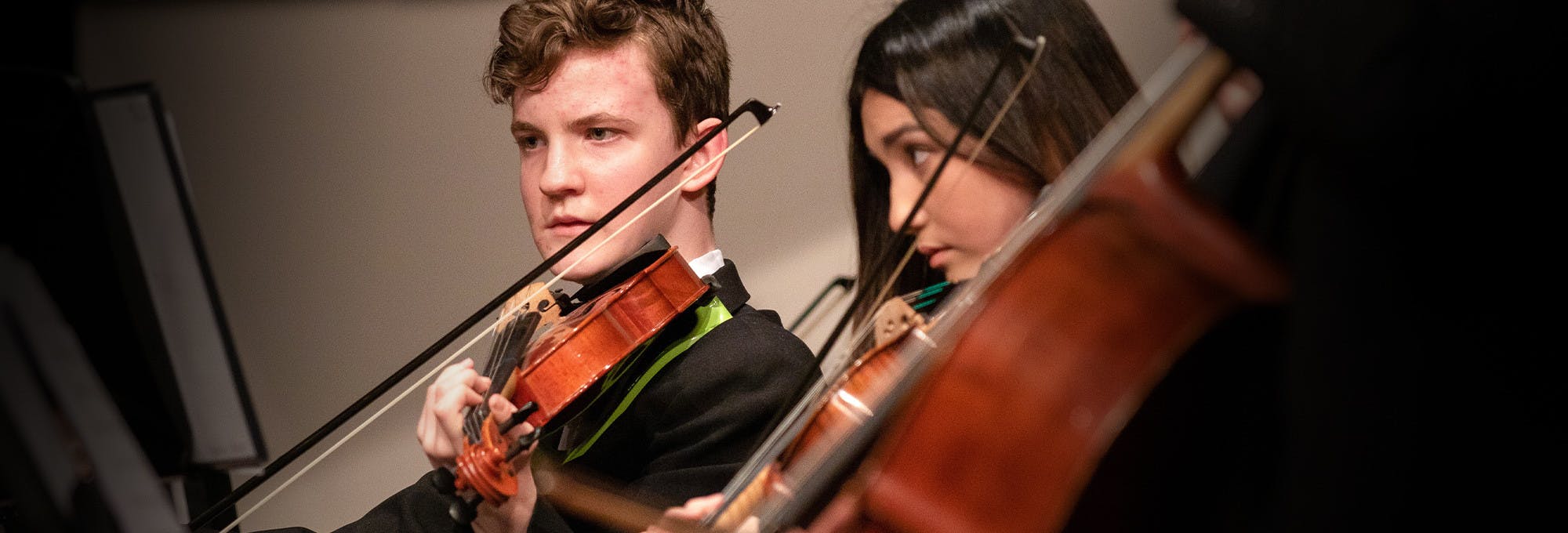
College Success
Best Self-Care Tips for College Students | Outlier
A guide to self-care at college—and why self-care is an essential skill to learn.
Daisy Hill
Author

Psychology
08.28.2023 • 7 min read
Contributor
Here’s a comprehensive guide to understanding Gardner’s multiple intelligences theory. You’ll also read about the theory’s criticism and learning styles.
In This Article
I never expected my son's high school music concert to leave me awestruck. Don't get me wrong. My son's a talented kid, and so are many of his classmates.
But I have to be honest: I anticipated 90 minutes of sporadically off-key numbers that make a parent both proud and impatient to head home.
That is, until I noticed a girl playing a different instrument in every number. At first I didn't trust my eyes. Maybe this piece's trumpet soloist only looked similar to the student on the xylophone. I scanned the faces of the other players.
Nope. Definitely the same girl.
For the next few songs, she also played the piano, electric bass, and drums. Then when I thought it couldn’t be more amazing, the girl sings a solo sounding like Adele.
Her singing was jaw-dropping.
I kept asking myself over and over, "How is she able to do that?". But even as I wondered at her gifts, I knew the answer. This child had unsurpassed musical intelligence.
She clearly understood music—rhythm, phrasing, tonality—on a far more sophisticated level than her peers.
All of which brings me to Howard Gardner's theory of multiple intelligences. Since its proposal 40 years ago, it has captured the imaginations of educators. But it’s also generated significant pushback from the psychology establishment.
Let’s explore Gardner's multiple intelligences theory, including the criticism and its relation to learning styles.
Howard Gardner is a renowned American psychologist and professor at Harvard University. He is best known for his theory of multiple intelligences, which he first presented in his 1983 book Frames of Mind: The Theory of Multiple Intelligences.
Gardner has spent most of the past 40 years developing and defending his multiple intelligences theory. Though he did not originally envision the theory as a model for educational practice, teachers embraced it enthusiastically. This led him to focus his later work on its implications in the classroom.
You can now apply the theory of multiple intelligences to help you be successful in college.
In Frames of Mind, Gardner challenged the concept of intelligence being a single, ingrained trait only measurable with an I.Q. test.
Instead, Gardner proposed that intelligence is a biopsychological potential allowing people to process information in certain ways. Basically, people can be different types of learners depending on their own type of intelligence.
His theory claims human beings have 8 distinct intelligences they use to solve problems or create products valued in a community.
Gardner uses a computer metaphor to contrast these 2 definitions of intelligence. The previous definition of intelligence (focused on I.Q. test results) treated the brain like a computer. The computer—or person—with the highest performance metrics is the most intelligent.
Gardner's theory of multiple intelligences views the brain as operating 8 separate computers at the same time. Each computer has unique capabilities that do not necessarily influence the performance of the others.
The multiple intelligences theory makes a lot of sense. Gardner felt I.Q. tests only focused on math and language skills and didn't look at all the ways people can be smart. He thought about why some really smart people might do silly things or why a great artist might not be good at math. He wanted a theory that covered all the different ways people can be smart.
So, he came up with 8 kinds of smarts instead of one.
Students who understand their own strengths and types of intelligence can set career goals based on their skills.
Naturalistic intelligence is the ability to identify, classify, and manipulate elements of the environment, like objects, animals, or plants.
In the natural world, this intelligence might look like the ability to tell plants or cloud formations from one another. But it's equally present in everyday events, like picking out produce at the grocery store or predicting driving conditions.
People with strong naturalistic intelligence may choose careers using observation and classification of their worlds—like marine biology or real estate assessment. They may learn through making comparisons between facts, objects, or concepts.
Spatial Intelligence is the ability to perceive and derive insight from visual data.
It means being good at judging distances and imagining objects in 3D. It can also help in predicting chess moves.
People with strong visual skills might like flying planes, designing buildings, or making sculptures. They often learn best by watching or making pictures.
Language intelligence is superior understanding of spoken and written words.
People with a heightened verbal-linguistic intelligence tend to understand written content or learn new languages easily. They enjoy debate, discussion, and developing stories. They're attracted to jobs like law or creative writing, and may learn well by reading written material.
Self-intelligence is the ability to observe and understand oneself and to plan actions accordingly.
We may describe people with high intrapersonal intelligence as self-aware, introspective, or in touch with their feelings. These traits are useful in everyday life and do not necessarily point towards any specific career.
An intrapersonally intelligent person may learn well by reflecting on their own strengths and weaknesses. They accept criticism to help them reach their goals.
The ability to understand other people, how they work, and what motivates them.
Interpersonal intelligence means understanding people's feelings and getting along with different personalities. People with this skill might be good at politics, sales, or counseling, and they make great leaders. They learn best in groups and by talking with friends.
Logical-Mathematical Intelligence is the ability to think conceptually and abstractly, finding logical or numerical patterns.
Logical-mathematical intelligence corresponds closely with what psychologists consider "g", or general intelligence. This is what most people call "being smart." It means being good at math and understanding rules.
Mathematicians and scientists usually have this intelligence. They can learn best by memorizing and following steps.
Musical Intelligence is the ability to think in terms of musical sounds, rhythms, melodies, and tones.
Musical intelligence is often reflected in a talent for creating music, singing, or playing instruments. High musical intelligence can lead to careers in musical performance or composition, and may assist in auditory learning.
The ability to use one's body to accomplish tasks, solve problems, or make things.
Bodily-kinesthetic intelligence means being good with body movement and physical skills. People with this might like sports, dancing, surgery, or woodworking. They learn best by doing things with their hands.
Gardner's idea of multiple intelligences faces criticism, especially from experts who rely on testing to study intelligence. These critics argue there's no solid proof for his theory, even 40 years after it was first shared.
Gardner has a counter. He points to new brain studies that show different brain areas light up for different tasks. This supports his idea of the brain having separate "systems" to categorize each intelligence.
Some critics challenge the theory's definitions. They believe Gardner's 8 intelligences are parts of what regular I.Q. tests measure. For instance, people who are good at music can have strong spatial skills too. This suggests the intelligences might not be as separate as Gardner thinks.
Despite these points, Gardner and his fans believe there's more to intelligence than I.Q. tests show. They argue these tests miss many of a person's unique strengths and areas of challenge.
Many teachers like Gardner's idea of multiple intelligences and use it for curriculum development. They see it in students who do well in some subjects but not others.
However, there are some misunderstandings. Some teachers think this theory is the same as "learning style," which is how a person likes to learn. They even say they should teach based on a student's favorite way of learning because of Gardner's theory.
But Gardner didn't say that. He never really supported the idea of "learning styles." Plus, some research shows teaching to a student's preferred style doesn't always help them do better. Instead, it might help to focus on their weaker areas.
Gardner suggests 2 ways to use his multiple intelligences theory in school:
Teach in a way that fits each student's unique strengths and challenges.
Use various teaching methods to help all students learn the best they can.
Gardner believes his theory about different intelligences is popular because we see it in real life. When we watch events, like high school music shows, we see how smart people are in different ways. Gardner thinks being amazed by a student's musical talent shows that you can't measure intelligence with just one test score.
Outlier (from the co-founder of MasterClass) has brought together some of the world's best instructors, game designers, and filmmakers to create the future of online college.
Check out these related courses:

College Success
A guide to self-care at college—and why self-care is an essential skill to learn.
Author

College Success
Learn why self-advocacy for students is important, the benefits it has for college students, and frequently asked questions about self-advocacy.
Subject Matter Expert

College Success
Learn how to deal with anxiety in college. Read about what anxiety is, why anxiety relief is essential, and tips on dealing with anxiety.
Subject Matter Expert